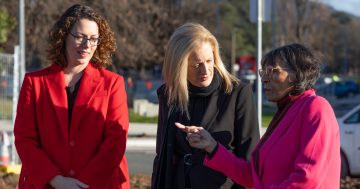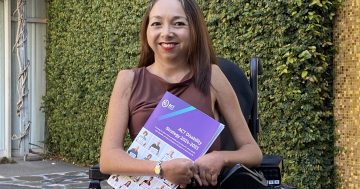
GHD Indigenous Engagement Leader Elle Davidson speaking recently. Photo: Supplied.
Infrastructure consultancy firm GHD has had a major presence here in Canberra since 1966. As an engineering, architecture, environmental and construction services consultancy, they work on big national projects, and in recent years they’ve had a big (and very serious) focus on Reconciliation.
The company’s projects in the region including work on the ACT Healthy Waterways and new Courts facilities project, the Australian Bureau of Statistics fit-out, wastewater treatment plants in Queanbeyan and ACT and the duplication of Ashley Drive in Tuggeranong.
Acknowledgement, consideration and valuing of Aboriginal culture is a fundamental priority for the firm, and that makes GHD an interesting case study for how Reconciliation can be embedded in business practises rather than seen as a box-ticking exercise.
Elle Davidson who is GHD’s national Indigenous Engagement Leader (and a Balanggarra woman from the East Kimberley) says that “One of the big motivations for contributing to reconciliation is that GHD works on Aboriginal land, wherever we are.
“Our work is all about infrastructure projects and we want to acknowledge and pay respect to the fact that we are operating on traditional custodian land. That means we are looking at ways that we can incorporate cultural values into our operations and projects”.
GHD has an Innovate level Reconciliation Action Plan and 336 indigenous employees and Davidson says that a strong current focus is on incorporating cultural, values into their built form projects.
“New Zealand has a very strong Maori presence in their public places, and that shows their connection and respect to Maori culture. That needs to happen more frequently in Australia so that the wider public is thinking about Aboriginal culture in their everyday lives.”
“We think there is also a need for visual cues and representation in our cities and towns so there is a reference point and way to celebrate our rich indigenous history”, she says.
This could mean anything from public art and building design to having stories woven through pavements, native bush tucker gardens, reconciliation gardens, and other ways to incorporate culture in the built form.
Davidson says these visual cues give people an opportunity to learn more about the history of a place by putting that story in front of mind. But she believes there is also strong value for GHD’s own workers in considering indigenous cultural thinking as part of their everyday planning and processes.
“Certainly, it’s a way for us to move forward as a company too”, she says. “Our motivation for putting the Reconciliation Action Plan in place was that GHD already has a strong focus on diversity and a culture of people being inclusive and respectful.
“Introducing the RAP has been a great platform to encourage people to think more broadly about living and working on Aboriginal and Torres Strait Islander country. With theThrough the RAP program in any organisations, people are exposed, they learn something that challenges them and their perceptions of culture and history.
“Maybe there will be something they once thought wasn’t a problem but now understand differently. Then people get motivated and want to do something about Reconciliation. Through the RAP we can then find ways to harness those intentions and try to give people opportunities in work and projects to contribute”.
Davidson says GHD sees the Reconciliation Action Plan as a way to create lasting community benefit. Ideally, the RAP priorities harness that goodwill she’s talking about to create lasting economic benefit and good, functional infrastructure for Aboriginal communities in their projects.
“There’s a flow down effect when people engage”, Davidson says. “They get motivated, there’s this great snowball effect when people are motivated by good outcomes and doing something worthwhile”.


















